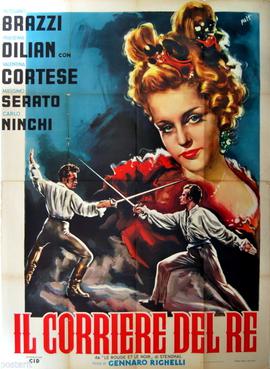Related Research Articles

The City Stands Trial is a 1952 Italian crime drama film directed by Luigi Zampa and starring Amedeo Nazzari, Silvana Pampanini and Paolo Stoppa. It is based on a revisiting of the Cuocolo murders and the struggle for control of Naples by the Camorra in the early 1900s. It is considered to be Zampa's most accomplished film. It was shot at the Cinecittà Studios in Rome and on location in Naples. It was entered into the 3rd Berlin International Film Festival.

The Captain's Daughter is a 1947 Italian historical adventure film directed by Mario Camerini and starring Irasema Dilián, Amedeo Nazzari and Vittorio Gassman. It was one of a number of ambitious historical epics made in the wake of the successful 1946 film The Black Eagle. The film's sets were designed by the art director Piero Filippone. It was entered into the 1947 Cannes Film Festival. It is based on the 1836 novel of the same name by Alexander Pushkin, which is set in Russia during the reign of Catherine II. It takes place during the Cossack Rebellion.

Arturo Ambrosio (1870–1960) was an Italian film producer who was a pioneering and influential figure in the early years of Italian cinema.

Luigi Maggi was an Italian actor and film director who worked prolifically during the silent era. Working for Ambrosio Film he co-directed the 1908 hit film The Last Days of Pompeii, which launched the historical epic as a popular Italian genre.

Ambrosio Film was an Italian film production and distribution company which played a leading role in Italian cinema during the silent era. Established in Turin in 1906 by the pioneering filmmaker Arturo Ambrosio, assisted by cinematographers Giovanni Vitrotti and Roberto Omegna, the company initially produced large numbers of documentary and fictional short films, but its output quickly grew more ambitious.

Eternal Melodies is a 1940 Italian historical drama film directed by Carmine Gallone and starring Gino Cervi, Conchita Montenegro and Luisella Beghi. It was one of several musical biopics directed by Gallone. The film was shot at Cinecittà in Rome.

Red Shirts is a 1952 French-Italian historical drama film directed by Goffredo Alessandrini and Francesco Rosi and starring Anna Magnani, Raf Vallone and Alain Cuny. The title refers to the historical Redshirts. It is also known as Anita Garibaldi. The film portrays the life of Anita Garibaldi (1821–1849), the wife of Italian unification leader Giuseppe Garibaldi.

The Courier of the King is a 1947 Italian historical film directed by Gennaro Righelli and starring Rossano Brazzi, Irasema Dilián and Valentina Cortese. It is an adaptation of the 1830 novel The Red and the Black by Stendhal. It was the final film of the veteran director Righelli, who had previously directed a silent version of the story in 1928. The film's sets were designed by the art director Ottavio Scotti.

The Charterhouse of Parma is a 1948 French-Italian historical drama film directed by Christian-Jaque and starring Renée Faure, Gérard Philipe and Maria Casarès. It is based on the 1839 novel of the same name by Stendhal. The film's sets were created by the art directors Jean d'Eaubonne and Ottavio Scotti and the costumes were designed by Georges Annenkov. The film was made at the Cinecittà Studios in Rome while location shooting took place in Italy around Milan and Lake Como.
Brutus is a 1911 Italian silent historical film directed by Enrico Guazzoni and starring Amleto Novelli. The film portrays the life of Marcus Junius Brutus the Younger, one of the assassins of Julius Caesar. The film was moderately successful, but not on the scale of his Quo Vadis the following year which was a major international hit.

Agrippina is a 1911 Italian silent historical film directed by Enrico Guazzoni and starring Adele Bianchi Azzarili, Amleto Novelli and Maria Caserini. The film portrays the life of Agrippina the Younger, and was part of the move towards Roman epics in early Italian cinema.

Julius Caesar is a 1914 Italian silent historical film directed by Enrico Guazzoni and starring Amleto Novelli, Bruto Castellani and Pina Menichelli. Taking minor inspiration from William Shakespeare's 1599 play of the same title, the film portrays the events leading up to the assassination of Julius Caesar. In the wake of Guazzoni's internationally successful Quo Vadis it was produced on an epic scale, including vast sets recreating Ancient Rome and more than 20,000 extras.
Messalina is a 1924 Italian historical drama film directed by Enrico Guazzoni and starring Rina De Liguoro, Calisto Bertramo, and Gildo Bocci. It portrays the life of Messalina, the third wife of the Roman Emperor Claudius.
The Sack of Rome is a 1920 Italian silent historical film directed by Enrico Guazzoni and Giulio Aristide Sartorio. The film portrays the 1527 Sack of Rome.
The Unione Cinematografica Italiana (UCI) was an Italian film production and distribution consortium of the silent era. Following the end of the First World War, a group of eleven leading Italian companies joined forces in a single conglomerate which would be better able to compete with rival films from America, Britain, France and Germany. The driving force behind UCI was Baron Alberto Fassini, who had previously headed the Cines studio.

King Lear is a 1910 Italian silent historical drama film directed by Gerolamo Lo Savio and starring Ermete Novelli, Francesca Bertini and Olga Giannini Novelli. It is an adaptation of William Shakespeare's King Lear.

The Lady of the Camellias is a 1915 Italian historical drama film directed by Gustavo Serena and starring Francesca Bertini. It is an adaptation of Alexandre Dumas, fils' novel The Lady of the Camellias.
Caesar Film was an Italian film production and distribution company founded in 1913. The studio's owner Giuseppe Barattolo built it into one of the more successful silent film companies of the 1910s, thanks partly to signing up the diva Francesca Bertini to make a series of films.
What a Distinguished Family is a 1945 Italian "white-telephones" comedy film directed by Mario Bonnard and starring Gino Cervi, Assia Noris and Aroldo Tieri.

Itala Film was an Italian film production company.
References
- ↑ Moliterno p.158